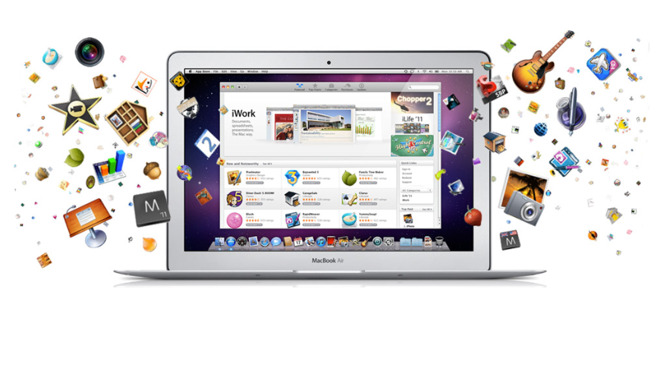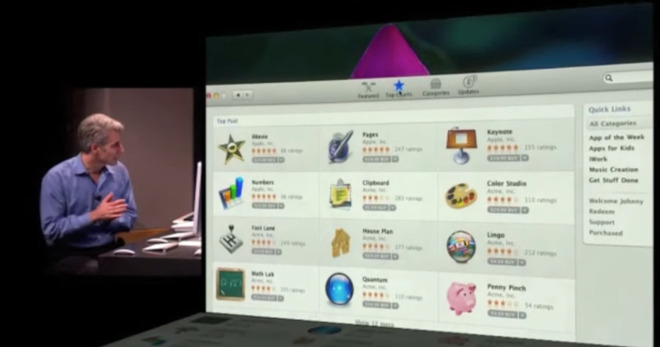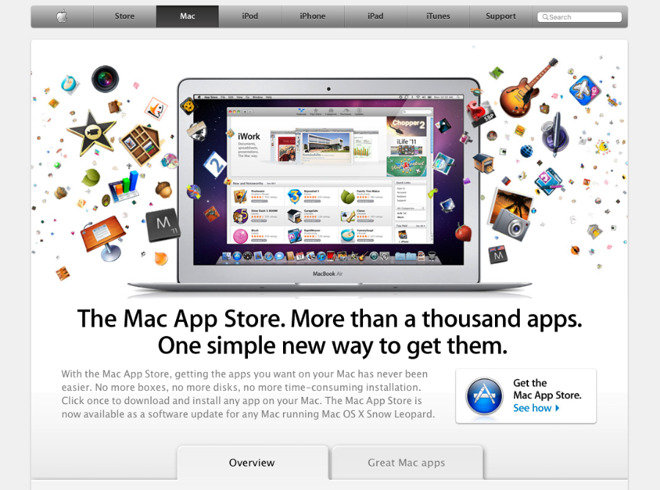Ten years of the Mac App Store, the 'best place' to buy apps
A decade after its launch, the Mac App Store failed to replicate the success of the iOS version, but it did make finding and downloading apps faster and more convenient for macOS users.

The original Mac App Store
Within limits, you can install any macOS app on your Mac, wherever you got it from. And as successful as the Mac is, nothing comes close to being the hit that the iPhone has been. So it was never going to be possible to have a Mac App Store become the home for hundreds of thousands of apps.
Still, on January 6, 2011, the Mac App Store opened with 1,000 apps. According to AppShopper, by the same day ten years later, it had 18,950.
It's not just a case of that number being a fraction of the estimated 536,970 apps built for both iPhone and iPad. Some developers have baulked at joining the store, and complying with Apple's stringent rules.
Those rules are meant to prevent one app from controlling the Mac to perform operations the user doesn't want, but that also prevents some that they do. Rogue Amoeba, for instance, makes audio recording software, most of which needs macOS access the Mac App Store won't allow.
As well as technical reasons, there have been business and commercial ones that mean developers stay away. Microsoft, for instance, did not bring its Word, Excel and PowerPoint apps to the store until 2019.
"The App Store has been huge, as you know," said Steve Jobs as he announced the Mac App Store in October 2010. "On the iPhone, it's completely revolutionized mobile applications. On the iPad, it's phenomenal as well."
"Now how do we know this?" he continued. "Because over seven billion apps have been downloaded from the App Store. Seven billion. There's never been anything like this that we've seen in our careers. And so we'd like to bring it to the Mac."
Jobs was speaking at the "Back to the Mac" event, which unveiled an updated MacBook Air, and introduced Mac OS X Lion. "And as part of Lion, we're gonna have a Mac App Store," continued Jobs.
"It's going to be the best place to discover apps, just like it is on the iPhone and the iPad," he said. "Won't be the only place, but we think it'll be the best place."
That last part was delivered almost as a throwaway aside, but it was significant and Jobs knew it. For decades, Mac users had been buying apps from third-party developers, at first in cardboard boxes, and later via direct downloads.
What Jobs was really saying here was that the Mac App Store wasn't meant to stop this. The implication was that you wouldn't bother going anywhere else once you'd used the Mac App Store, but Apple was not going to lock out apps from other sources.

Craig Fedierghi demonstrates the Mac App Store in 2010
The Mac App Store followed in 2011, then there was the Apple TV App Store, which was announced in 2015. Finally, so far, there is also now the Apple Watch App Store, which debuted alongside watchOS 6 in 2019.
Strictly speaking, the Apple Watch App Store is a subset of the iOS one. You can download certain apps directly to the Apple Watch itself, but you can still download all Watch apps via the iPhone.
Unlike the Mac version, then the respective App Stores are the only way to install apps on the Apple Watch and Apple TV.
That perhaps shows how Apple has changed over the first decade since the Mac App Store was introduced. It still does not stop you buying Mac apps directly from vendors outside the Store, but it does make it harder than it was.
For quite clear and practical security reasons -- and surely at least in part also commercial ones -- Apple has been blocking non-App Store apps. Since 2016, it has begun making it increasingly inconvenient to launch apps that aren't either from the store or from recognized developers.
More recently, though, it has also sought to radically expand on the number of apps available in the Mac App Store. First it did so via its Catalyst program, which aims to make it possible for developers to quickly bring iOS apps to the Mac.
Then it introduced Apple Silicon Macs, whose processors make it possible to run iOS apps right alongside Mac ones.

The Mac App Store as originally promoted on Apple.com in 2011
Undoubtedly, there are apps you've bought direct from the developer's website and that you will continue to update from there. No question, it's worth checking out the developer's site because sometimes, for instance, they're able to offer better upgrade deals than the Mac App Store allows.
Yet it is now the case that many Mac users can buy a new machine and simply download every app they use. They have to sign in with their Apple ID at the start of the process, but after that, there are no more authentication codes, no more login details.
Everything just works, and the Mac App Store makes buying and using apps much more convenient. It still isn't the only place, but perhaps Steve Jobs was right when he said that it would become the best one for most users.
Keep up with AppleInsider by downloading the AppleInsider app for iOS, and follow us on YouTube, Twitter @appleinsider and Facebook for live, late-breaking coverage. You can also check out our official Instagram account for exclusive photos.

The original Mac App Store
Within limits, you can install any macOS app on your Mac, wherever you got it from. And as successful as the Mac is, nothing comes close to being the hit that the iPhone has been. So it was never going to be possible to have a Mac App Store become the home for hundreds of thousands of apps.
Still, on January 6, 2011, the Mac App Store opened with 1,000 apps. According to AppShopper, by the same day ten years later, it had 18,950.
It's not just a case of that number being a fraction of the estimated 536,970 apps built for both iPhone and iPad. Some developers have baulked at joining the store, and complying with Apple's stringent rules.
Those rules are meant to prevent one app from controlling the Mac to perform operations the user doesn't want, but that also prevents some that they do. Rogue Amoeba, for instance, makes audio recording software, most of which needs macOS access the Mac App Store won't allow.
As well as technical reasons, there have been business and commercial ones that mean developers stay away. Microsoft, for instance, did not bring its Word, Excel and PowerPoint apps to the store until 2019.
App Store by the numbers
The number of available apps is one thing, the number of times each one is downloaded is another. Apple doesn't tend to talk much about the number of downloads the Mac App Store gets, but it was this figure that prompted the company to bring the store to the Mac."The App Store has been huge, as you know," said Steve Jobs as he announced the Mac App Store in October 2010. "On the iPhone, it's completely revolutionized mobile applications. On the iPad, it's phenomenal as well."
"Now how do we know this?" he continued. "Because over seven billion apps have been downloaded from the App Store. Seven billion. There's never been anything like this that we've seen in our careers. And so we'd like to bring it to the Mac."
Jobs was speaking at the "Back to the Mac" event, which unveiled an updated MacBook Air, and introduced Mac OS X Lion. "And as part of Lion, we're gonna have a Mac App Store," continued Jobs.
"It's going to be the best place to discover apps, just like it is on the iPhone and the iPad," he said. "Won't be the only place, but we think it'll be the best place."
That last part was delivered almost as a throwaway aside, but it was significant and Jobs knew it. For decades, Mac users had been buying apps from third-party developers, at first in cardboard boxes, and later via direct downloads.
What Jobs was really saying here was that the Mac App Store wasn't meant to stop this. The implication was that you wouldn't bother going anywhere else once you'd used the Mac App Store, but Apple was not going to lock out apps from other sources.

Craig Fedierghi demonstrates the Mac App Store in 2010
An expanding list of App Stores
When you say App Store, you mean the iOS one. It is the Biro or Hoover of app stores, it's been that successful since its launch in 2008.The Mac App Store followed in 2011, then there was the Apple TV App Store, which was announced in 2015. Finally, so far, there is also now the Apple Watch App Store, which debuted alongside watchOS 6 in 2019.
Strictly speaking, the Apple Watch App Store is a subset of the iOS one. You can download certain apps directly to the Apple Watch itself, but you can still download all Watch apps via the iPhone.
Unlike the Mac version, then the respective App Stores are the only way to install apps on the Apple Watch and Apple TV.
That perhaps shows how Apple has changed over the first decade since the Mac App Store was introduced. It still does not stop you buying Mac apps directly from vendors outside the Store, but it does make it harder than it was.
For quite clear and practical security reasons -- and surely at least in part also commercial ones -- Apple has been blocking non-App Store apps. Since 2016, it has begun making it increasingly inconvenient to launch apps that aren't either from the store or from recognized developers.
More recently, though, it has also sought to radically expand on the number of apps available in the Mac App Store. First it did so via its Catalyst program, which aims to make it possible for developers to quickly bring iOS apps to the Mac.
Then it introduced Apple Silicon Macs, whose processors make it possible to run iOS apps right alongside Mac ones.

The Mac App Store as originally promoted on Apple.com in 2011
The legacy of the Mac App Store
As yet, the Mac App Store hasn't seen a massive rush of iOS developers racing to get their apps onto the Mac. Whether or not its numbers suddenly swell, though, the Mac App Store has successfully changed the way all of us use our Macs.Undoubtedly, there are apps you've bought direct from the developer's website and that you will continue to update from there. No question, it's worth checking out the developer's site because sometimes, for instance, they're able to offer better upgrade deals than the Mac App Store allows.
Yet it is now the case that many Mac users can buy a new machine and simply download every app they use. They have to sign in with their Apple ID at the start of the process, but after that, there are no more authentication codes, no more login details.
Everything just works, and the Mac App Store makes buying and using apps much more convenient. It still isn't the only place, but perhaps Steve Jobs was right when he said that it would become the best one for most users.
Keep up with AppleInsider by downloading the AppleInsider app for iOS, and follow us on YouTube, Twitter @appleinsider and Facebook for live, late-breaking coverage. You can also check out our official Instagram account for exclusive photos.

Comments
- Super Ziotic
Let’s take MacOS updates as an example, simply because just last night it royally pissed me off.
I just bought a late 2013 iMac which shipped with Mountain Lion, it’s my daughters first Mac. You’d assume that you’d just go to the App Store on said Mac and download the latest version of MacOS available for that computer. But that’s not the case, you can browse for any version you want but you only get results for Big Sur and that’s not available for that Mac even though there is no technical reason as to why it’s not compatible (it’s running it beautiful via Patched Sur, Quad Core i7 2013 iMac is a no but 2013 dual core i5 MacBook Air with just 4GB of ram is fine, seriously, WTF Apple!).
In the end I just found a copy of Mojave on my NAS and made my own bootable USB, but seriously most people are not as technical as me and Mac’s are supposed to just work. What a cluster fuck of terrible design and restrictions.
The Mac App Store is full of crap apps, those few apps that are worth owning are usually far cheaper outside of said App Store.
Yeah, that was a firm nope. If he’d been a long term Mac user he could have gone into his Mac App Store purchase history and download it from the Mac App Store, but as a new user to the platform he was fucked. Dumb Apple, such an unbelievable own goal.
In the end I had to drop box copies to him that were stored on my NAS.
Does this mean the App Store is broken, or simply that Apple doesn't have a coherent story to tell when it comes to managing backward compatibility of its own apps? I know that apps like VMWare Fusion do allow you to download the installation images for every version that you've ever purchased. If the Mac App Store followed a similar model should Apple require all developers who are part of the App Store to follow a similar model with respect to support for old versions of their apps?
All of these questions and concerns are valid. I think it's just like everything else with Apple. They draw a box around what the will allow based on providing the best user experience for the greatest number of their customers. As individuals we sometimes find ourselves on the outside looking in, which sucks for us.
Maybe you can use the free VMWare Fusion Player 12 to solve your GarageBand problem (and likely Pages/Numbers/Keynote too) by installing Big Sur on a VM. Not ideal, but it might work.
Fixing headline:
Ten years of the Mac App Store, the 'only place' to buy apps